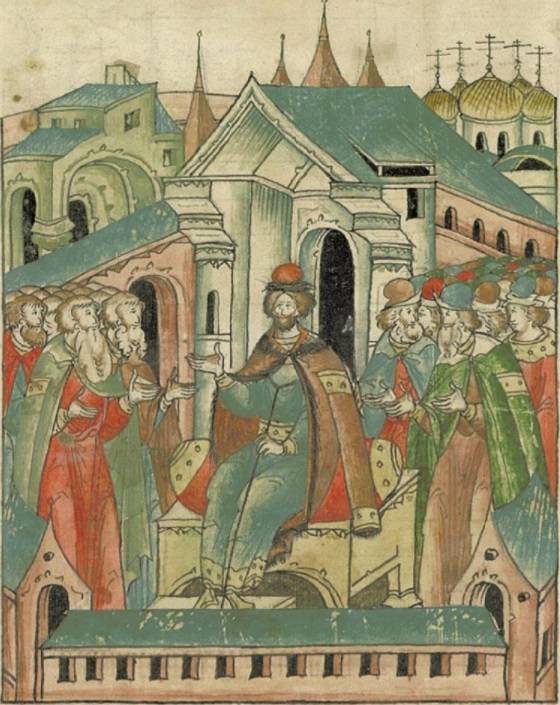“Go, prince, to the table of your father and grandfather”

Vladimir Monomakh on the throne of Kiev, Front Chronicle, XNUMXth century
"The property of Dazhd-God's grandchildren perished"
In April 1113, the great Russian prince Svyatopolk II Izyaslavich fell ill and died. His reign for Rus' was difficult. Several bloody internecine wars swept between the Russian princes. The Polovtsy took advantage of this, they had to wage heavy wars. Prince Vladimir Monomakh became famous in these wars.
Therefore, in the "Word of Igor's Campaign" it is noted:
Svyatopolk himself was distinguished by great greed. His environment was appropriate. The prince's pets went into all serious trouble, robbing the people. The Jewish ("Kazar"-Khazar) quarter in Kyiv flourished even more than under Izyaslav. The Jews were under the special patronage of the prince. They "received many pre-Christian liberties", many Kievans "lost trade and crafts."
Also, the Jews of Kyiv had connections with their fellow tribesmen in the former Khazaria, in the Crimea, who restored the profitable slave trade with the countries of the East. The Polovtsy drove people in full, and the slave merchants bought them up and sold them further to the bazaars of the Caucasus, Persia and Egypt. The laws of Byzantium forbade the Gentiles to trade in Christians, but the local authorities turned a blind eye to this, receiving "kickbacks" and generous gifts. In addition, the slave traders for the sake of appearance adopted Christianity, receiving the legal right to trade in Christians.
And the Kiev prince himself was not shy about making money. The former rulers granted a monopoly on the salt trade to the Pechersk Monastery. Svyatopolk took it away, began to trade in salt through his tax-farmers. His son from the concubine Mstislav killed the monks Fedor and Vasily, seeking the so-called Varangian gold and silver, which was stored in the Varangian cave, in which the monk Fedor lived. He was informed that the monks had found the treasure and were hiding it.
Having no support among the people, Svyatopolk looked for her among foreigners. Tried to get closer to Poland and Hungary, with Byzantium. For a formal alliance with Constantinople, Svyatopolk recognized the loss of Tmutarakan, was listed as a vassal of the basileus, and completely surrendered his position to the Russian Church. The Caves Monastery, which was in opposition to the Grand Duke, was taken under control. At this time, The Tale of Bygone Years was severely edited. Places in the Russian chronicle that were objectionable to the Grand Duke and the Byzantine Greeks were "cut off". Svyatopolk, his brothers and father Izyaslav were praised in every possible way. Khazaria, the great victories of Svyatoslav Igorevich over the Khazars, practically disappeared from the annals.
The "Kazarsky" quarter rose. The Jews became financiers-usurers, officials, tax collectors. Having captured profitable trades and crafts, having ruined people, moneylenders-financiers "rescued" them with loans. They entangled with interest and enslaved people who could not repay their debts were sold into slavery. From the Russian capital, ships with slaves went south. From Kherson, the unfortunate were taken further, to the eastern harems and brothels, to the mines and to the galleys.
The popular uprising
After the death of Svyatopolk, the people of Kiev turned to Monomakh. His name was on everyone's lips: a direct and just man, a peacemaker among princes, a thunderstorm of the Polovtsians. But the Pereyaslavl prince, like 20 years ago, refused the Kyiv table. He did not want to break the traditional order: according to the system of ladders (ladders), Svyatopolk Izyaslavich was to be succeeded by the Svyatoslavichs - Davyd Chernigov, Oleg Seversky, Yaroslav Muromsky. The Kievan boyars and the Jewish quarter also supported the Svyatoslavichs.
However, ordinary Kievans did not want the rule of the Svyatoslavichs, the continuation of the dominance of the rich and powerful. Prince Oleg was remembered as the initiator of the bloody turmoil. The city boomed in unison: “We don’t want Svyatoslavichev!” Tysyatsky Putyata and other boyars associated with usurers proposed a new candidate - the son of Svyatopolk, Yaroslav Volynsky.
The people exploded. The hatred accumulated over the years burst out. The Kievans destroyed the Putyaty's court, staged a pogrom in the Jewish quarter. Kiev nobility and clergy were afraid, they could be next. They called again to Vladimir:
After hesitating, Vladimir Vsevolodovich agreed. The arrival of Monomakh and his retinue restored order in the capital city. The rebellion stopped on its own, the people joyfully met their defender. The Svyatoslavs recognized the supremacy of Vladimir. They could not resist the desire of the entire Russian land.
Vladimir quickly eliminated the roots of the uprising. He replaced the capital administration headed by Putyata. The debts of the people of Kiev to the Jews were forgiven, those sold into slavery were released.
Monomakh decided to eliminate the source of the problem once and for all. Gathered princes and thousands. It was clear that the financiers-usurers were destroying the Russian land: by ruining and enslaving people, they thereby undermined the strength of the state and the princes. Therefore, it was decided to expel all the Jews from the borders of Rus'. They could take movable property, but had no right to return. Otherwise, they were outside the law.
Russkaya Pravda, the code of laws of the Russian state, was also supplemented. The Charter of Vladimir was adopted. He limited the arbitrariness of usurers. Thus, it was forbidden to take more than 20% per annum for the provided debt. The charter contained new provisions to alleviate the fate of smerds, purchases, ryadoviches, serfs (dependent categories of the population). In particular, the sources of servility were clearly defined.
This made things easier for the common people.
Information